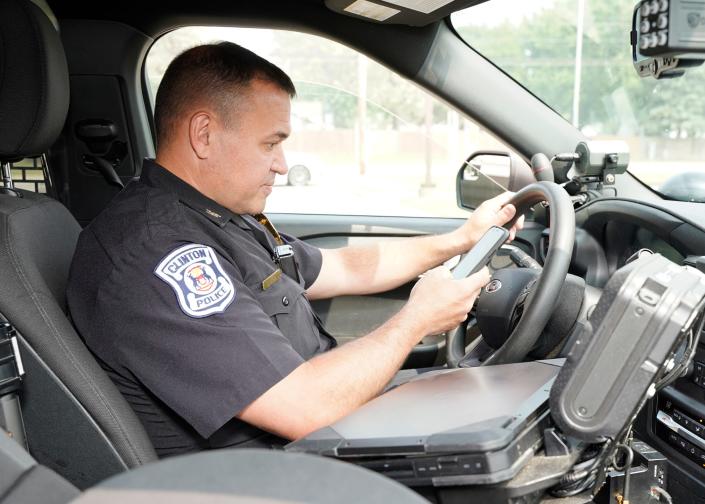
Michigan motorists for some time have been urged to focus more on the road and less on their electronic devices while behind the wheel.
A new statewide law that went into effect Friday aims to prohibit the use of cellphones and other devices while driving in most instances.
Michigan’s distracted driving law has been updated. As of June 30, it prohibits the use of a cellphone while driving unless it’s being used via a hands-free program or device or in an emergency.
This means drivers cannot text, scroll through social media apps, hold their phones to make calls or do anything else that requires them to physically hold the device while driving. This includes while being stopped at a red light or stop sign.
The enacted measure is all in the name of safety on the roadway, according to Lenawee County Sheriff Troy Bevier, who said the increase in distracted-driving crashes and similar data has been “eye-opening.”
“It is our hope that motorists obey the new law,” Bevier said. “When you are driving it is easy to get distracted. Having a phone in your hands is just one more thing that distracts drivers.”
Bevier said he anticipates some people will be surprised by the new law and that it will take some time before drivers’ mindsets start to change when it comes to leaving the cellphone alone when operating a vehicle.
For many people, cellphones are used for more than just calling or texting. Phones are also being used by drivers as their main source of music in the car or as a navigation system.
“That’s really the society we live in right now. We are always connected,” Bevier said.
The new distracted-driving law expands upon Michigan’s existing ban on texting and driving. State lawmakers and advocates for the new law say it brings the state’s policy closer to modern technology standards as many newer model vehicles already come equipped with Bluetooth connections and wireless and hands-free methods of communication.
There are very few exceptions to the rule of the new law, according to Clinton Police Chief Tony Cuevas.
Drivers can have their phones in their hands for making emergency calls or reporting a crime taking place. Emergency responders, such as police officers and ambulance drivers, are excluded from the new law, so long as any device use ensures their actual work responsibilities. Utility workers are also excluded from the distracted-driving law with the same caveat.
Michigan’s texting and driving laws needed to have solid evidence that texts were being sent and received in order for a motorist to receive a citation, Cuevas said. The new law, however, means any hands-on cellphone use while driving can lead to being pulled over and cited.
The intent of the law, Cuevas said, is to make drivers hands-free from their devices.
“You just see so many people using their phones as they are driving,” he said. “I do see it’s relatively easy to enforce.
“… Officers all over the United States see drivers driving distracted. As a society, we have gotten used to multitasking and I think that’s gotten into our driving habits. Our elected officials have started to say enough is enough when it comes to creating this new law.”
Subscribe Now: For all the latest local developments, breaking news, and high school and college sports content.
Madison Township Police Chief Michael Shadbolt said earlier this week the department was going through a briefing on the law prior to it taking effect Friday.
“We will enforce it as we see it,” he said. “We’re not going to actively look for such instances, but if we see something, then we’ll address it.”
Madison Township will not have a dedicated patrol solely for the purpose of enforcing the distracted driving law, Shadbolt said. Motorists, he added, need to be educated and knowledgeable of the laws going into effect. After some time, patrols in the township will regularly enforce the action.
For a first offense of the new distracted-driving law, drivers will have to pay a $100 fine and possibly do up to 16 hours of community service. Subsequent violations would have a $250 fine and up to 24 hours of community service. Fines would be doubled if the offense causes a crash.
Anyone who commits three violations of the distracted driving law in a three-year span would have to take a basic driving instruction course to avoid having their license revoked.
Bevier and Cuevas said the new law reminded them of when the seatbelt laws first went into effect.
“Seatbelt laws were unpopular in the beginning, but they have proven to be beneficial and have saved lives,” Bevier said.
Law enforcement will still target speeders, drunken drivers and those who are in violation of seatbelt laws, Cuevas said, in addition to the new distracted driving laws.
“Most laws, when enforced regularly, lead to a lot more compliance,” he said. “At some point, I think the enforcement of the (distracted-driving law) will build into an everyday behavior of people leaving their phones alone while driving.”
The Detroit Free Press contributed to this report.
This article originally appeared on The Daily Telegram: Lenawee County police chiefs, sheriff review distracted-driving law
